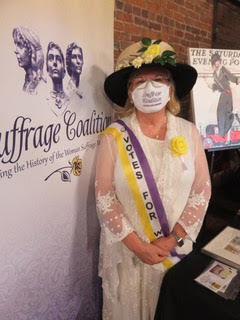
Wanda Sobieski of Suffrage Coalition
photo by John Shearer
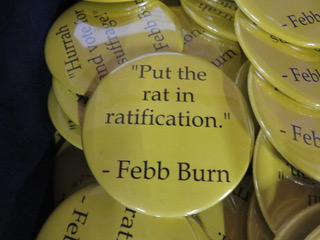
Commemorative buttons for sale
photo by John Shearer
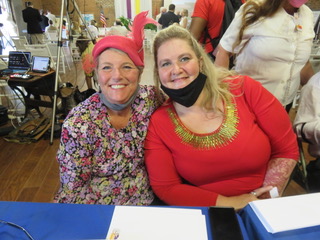
Patti Hall and Imogene Ellis at stamp cancellation table
photo by John Shearer
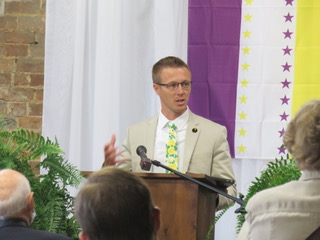
State Rep. Mark Cochran
photo by John Shearer
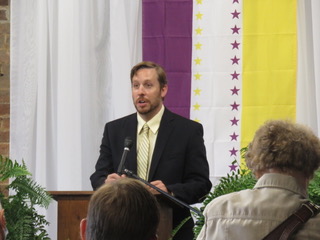
Author Tyler Boyd
photo by John Shearer
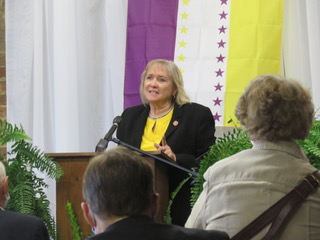
State Sen. Becky Duncan Massey
photo by John Shearer
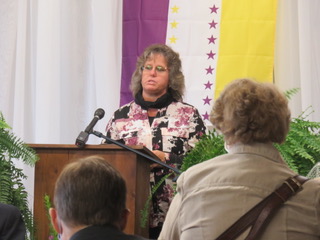
Chattanooga Postmaster Debra Groshko
photo by John Shearer
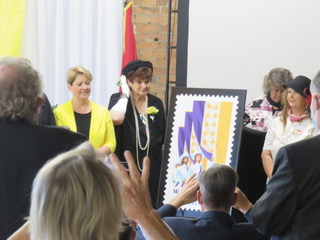
Stamp unveiling ceremony
photo by John Shearer
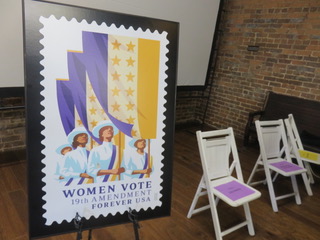
Enlarged version of commemorative stamp
photo by John Shearer
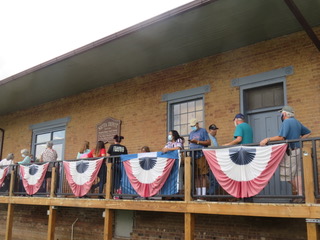
Line waits outside depot to purchase stamp
photo by John Shearer
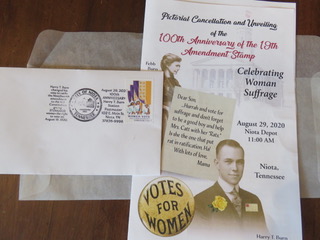
Canceled commemorative stamp and program cover
photo by John Shearer
One hundred years ago this month, plenty of loud cheers and jeers took place in Nashville after state legislator Harry T. Burn somewhat surprisingly broke a tie and helped Tennessee ratify the 19th Amendment giving women the right to vote.
Saturday at the Niota Depot in this small McMinn County community, the appreciative support was returned in a lower key but still appreciative way to honor the memory of this 24-year-old legislator who helped change history.
In front of a mostly socially distanced and invitation only crowd of around 50-75 people, due to the pandemic, an unveiling of the U.S.
Postal Service stamp commemorating the 100th
anniversary of the 19th
Amendment was held.
And on hand as a last-minute substitute to lead the unveiling was Chattanooga postmaster Debra Groshko, a move that officials said was appropriate since she is also the first woman head postmaster in the Scenic City.
It was the last statewide celebration of note this month marking the centennial of Tennessee’s role as the 36th and final state needed to ratify the amendment, and Niota was also the only place in the country that had a ceremony to unveil that stamp.
The 90-minute program inside the historic depot included more than a dozen speakers. The first, state Rep. Mark Cochran, said he identified very much with the late Mr. Burn in not only holding down Mr. Burn’s former seat, but also being the youngest Republican in the state House.
“I feel like I stand on the shoulders of a giant,” he said of this man who lived in the Chattanooga area briefly in the 1910s while working for the railroad. “He realized a vote for individual liberty was the right vote, and it’s an honor to be in his seat 100 years removed.”
Mr. Burn had solidified his vote for ratification in part due to a letter from his mother, Febb Burn, encouraging him to support it. Two of her descendants, Cathy Burn Allen and Sandra Burn Boyd, offered remembrances of her as a widowed mother who was well read and had to take care of the family farm, but could not vote.
They said both she and her son were inspirations for today.
“Her son realized he had a chance to change history,” said Ms. Allen. “We all need to remember to follow our soul, because we can all make a difference.”
Ms. Boyd’s son, Tyler Boyd, who recently wrote the biography, “Tennessee Statesman: Harry T. Burn,” pointed out that Mr. Burn also made a number of other positive contributions in his later life. That included helping lower the voting age and helping do away with the cumbersome poll tax for voters.
McMinn County Mayor John Gentry chronicled some of the rest of McMinn County’s colorful history, including the Battle of Athens that helped reform corrupt local elections and local elective bodies around the South. He praised current Chattanoogan and former McMinn County resident Steve Byrum’s book on the topic.
State Sen. Mike Bell and Rep. Cochran also read a proclamation honoring Mr. Burn, pointing out it was done partly because state legislative efforts had also been made to honor another legislator in the Tennessee House battle for ratification. That was apparently a reference to Rep. Banks Turner of Gibson County, who changed his 1920 committee vote to allow the full House to vote on ratification.
Current Niota Mayor Lois Preece discussed some statistics about the gains and shortcomings of women still holding only a minority of various elective offices around the country, although she did point out that Niota has had five women mayors since 1980. She ended up becoming mayor in 2011 after she was encouraged to serve when she retired as a principal.
Former Niota city commissioner Boots Snyder reflected on the late 1980s, when the entire Niota commission was made up of women, and such national news outlets as ABC’s “Good Morning, America,” highlighted the unique achievement.
Among the other speakers, Kelly Puckett, a representative of Sen. Marsha Blackburn, the first woman U.S. senator from Tennessee, highlighted her boss’ appreciation for the 19th Amendment.
Maxine Gernert, a representative for U.S. Rep. Chuck Fleischmann, also offered remarks and sent along Rep. Fleischmann’s good wishes. She also said a committee representative had invited First Lady Melania Trump and that, while unable to attend, she also passed along her greetings and support.
State Sen. Becky Duncan Massey from Knoxville said she had once met Harry T. Burn when she came with her father, former U.S. Rep. and Knoxville Mayor John J. Duncan, and also recalled later attending the 75th anniversary stamp unveiling in 1995.
“When I met Harry T. Burn, I didn’t realize the significance of his vote,” she said.
She later highlighted a number of past incidents in American history when the vote was close – including the election of Thomas Jefferson and the impeachment trial of Andrew Johnson. She said this should be kept in mind with the election coming up this fall.
Also in attendance and recognized was state Rep. Robin Smith from the Hixson area.
After the unveiling of the stamp, the general public – several dozen of whom were standing outside in line when the program ended – began buying canceled stamps that featured suffragists marching with banners.
Jcshearer2@comcast.net